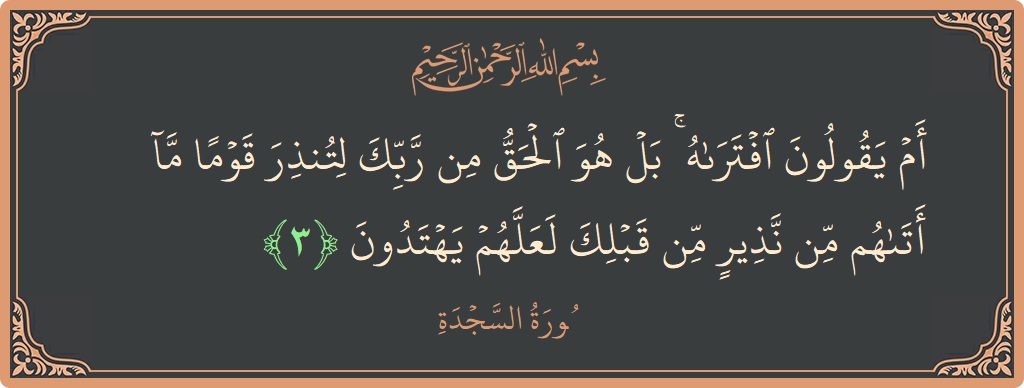Surah As-Sajda: Verse 3 - أم يقولون افتراه ۚ بل... - English
Tafsir of Verse 3, Surah As-Sajda
English Translation
Or do they say, "He invented it"? Rather, it is the truth from your Lord, [O Muhammad], that you may warn a people to whom no warner has come before you [so] perhaps they will be guided.English Transliteration
Am yaqooloona iftarahu bal huwa alhaqqu min rabbika litunthira qawman ma atahum min natheerin min qablika laAAallahum yahtadoonaTafsir of Verse 3
Commentary
At this place, the word: نَّذِيرٍ (nadhir: warner) in: مَّا أَتَاهُم مِّن نَّذِيرٍ (to whom no warner has come.. -3)means a rasul or messenger.The sense is that no messenger had appeared amidst the Quraish of Makkah before the Holy Prophet t. This does not mean that the call of the messengers had just not reached them until that time, because it was clearly said in another verse of the Qur'an: وَإِن مِّنْ أُمَّةٍ إِلَّا خَلَا فِيهَا نَذِيرٌ (And there was no community without a warner having passed among them - 35:24). In this verse, (i.e. the verse 35:24) the word: نَّذِيرٍ (warner) appears in its general lexical sense, that is, one who calls people towards Allah, whether a messenger or prophet or one of their deputies, khali'fah or the ` alim of din. So, from this verse, it seems that the call of pure monotheism (tauhid) had reached all communities and groups. That is correct in its place and certainly the dictate of universal Divine mercy. Commentator Abu Hayyan says that the call to tauhid and 'iman has never ceased in any time or place or people. And wherever a long time passed after the appearance of a prophet, it resulted in the dearth of those having the knowledge of the legacy of prophethood. Thereupon, some new prophet or messenger was sent. This requires that the call to tauhid should have reached the Arab peoples definitely, and much earlier. But, for this it is not necessary that the call should have been brought in by some prophet or messenger in person. It is possible that it may have reached through the learned serving as deputies to the prophetic mission. Therefore, the verses of this Surah, Surah Ya Sin and others which prove that no nadhir (warner) had appeared amidst the Quraish of Arabia before the Holy Prophet ﷺ must be approached with the necessary consideration that the word: نَّذِيرٍ (nadhir) used there should mean a prophet and messenger in the technical sense denoting that no prophet and messenger had come amidst those people before the Holy Prophet ﷺ - even though, the call to tauhid and 'iman may have reached there too through other means.
Before the period of فَترَۃ fatrah, that is, before the appearance of the Holy Prophet ﷺ ، it stands proved about some blessed souls who firmly adhered to the faith of Sayyidna Ibrahim and Ismail (علیہما السلام) . They believed in the Oneness of Allah and were averse to the worship of and sacrifices for idols.
Ruh-ul-Ma’ ani reports from the Maghazi of Musa Ibn 'Uqbah about one such person whose name was Zayd Ibn ` Amr Ibn Nufayl. He had also met the Holy Prophet ﷺ ، before he was ordained as a prophet. But, it was still before his prophethood that he died in the year the Quraish had built the edifice of the Baytullah - and this happened five years prior to his prophethood. About him, Musa Ibn 'Uqbah says, ` He used to stop the Quraish from indulging in the worship of idols. He opposed the offering of sacrifices in the name of idols as an evil practice and would not eat the meat from animals slaughtered by the Mushriks.'
Abu Dawud Tayalisi has reported from Sayyidna Said Ibn Zayd Ibn Amr ؓ ، the son of Zayd Ibn ` Amr Ibn Nufayl, one of the celebrated ten (عَشرۃ مُبَشّرّۃ) among the noble Sahabah, that he had submitted before the Holy Prophet ﷺ saying: "You already know about my father that he adhered to pure monotheism and rejected idolatry. Can I, then, pray for his forgiveness?" The Holy Prophet ﷺ said, "Yes, for him the prayer of forgiveness is permissible. He will, on the day of Qiyamah, rise as a community of his own." (Ruh-ul-Ma’ ani)
Similarly, Warqah Ibn Nawfal ؓ who was present during the initial period of the prophethood and the revelation of the Qur'an was an adherent of pure monotheism (tauhid). He had expressed his resolve to help the Holy Prophet ﷺ but he died soon after. These examples prove that the people of Arabia were though not totally deprived of the Divine call to faith and monotheism, but that no prophet had appeared amidst them as such. Allah knows best.
All three verses cited above carry an affirmation of the veracity of the Qur'an and the Prophet of Islam.
